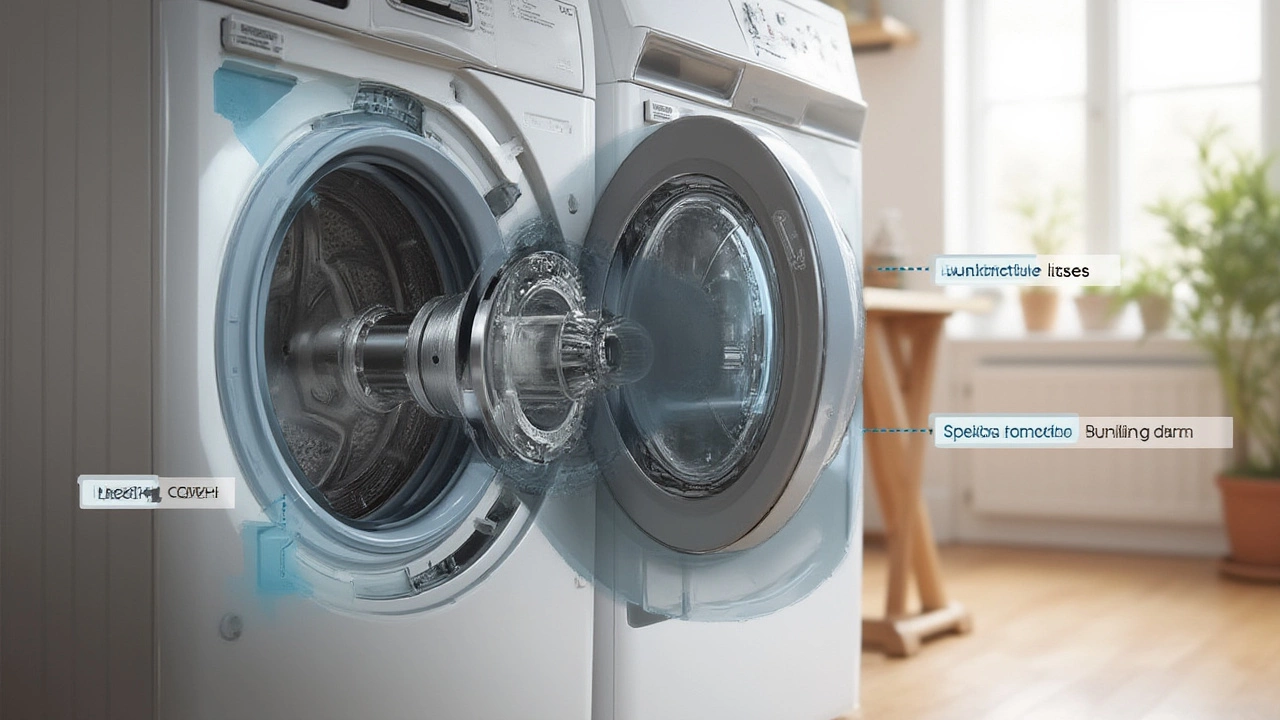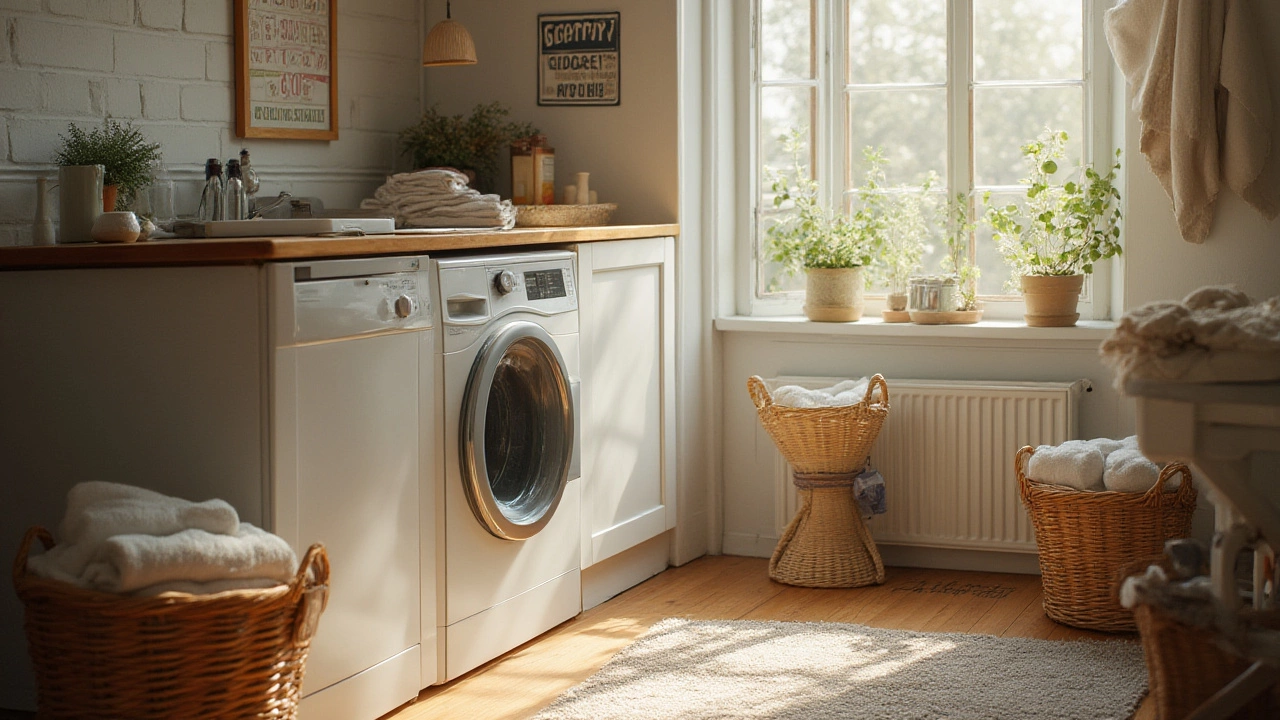Ever been hit with a surprise puddle and a blinking error code when you expected fresh laundry? If so, you're not alone. Washing machines are the quiet heroes of the modern home—until they suddenly stop mid-cycle and flood the floor. The thing is, figuring out how long a washing machine really lasts isn’t just about luck or brand loyalty. There’s solid data behind it, clear signs when things start to go wrong, and a bunch of ways to keep yours humming longer than average. Whether you’re eyeing a fancy new front-loader or coaxing one last season out of an old faithful top-loader, understanding the true lifespan of a washing machine can save you stress, time, and money.
How Long Does a Washing Machine Actually Last?
The magic number you’ll hear from most manufacturers is around 10 years. But like most things in life, it’s a little more complicated. The real range sits between 7 and 14 years depending on a bunch of stuff—brand, model, how often you use it, and what you throw in there. LG, Samsung, and Miele often get a reputation for lasting longer—some Miele machines are tested to survive 20 years. But the truth is, averages tell most of the story.
Let’s get specific for a moment. Consumer NZ ran a survey in 2024 with over 2,000 New Zealanders and discovered most washing machines start showing serious trouble after eight years. Around 75% of users said they hadn’t needed major repairs before that point. The numbers pretty much line up worldwide—a Yale Appliance report in the US quoted a repair rate of just 4% in the first five years, with rates climbing steeply afterwards. Here’s how it stacks up in a handy table for the popular brands:
| Brand | Average Lifespan (years) | First Major Problems (years) |
|---|---|---|
| Miele | 15-20 | 12 |
| LG | 13-15 | 10 |
| Samsung | 12-14 | 9 |
| Bosch | 10-12 | 8 |
| Fisher & Paykel | 8-10 | 7 |
| Whirlpool | 8-10 | 7 |
But there’s more to it than just brand and model. If you’re cramming bedding, trainers, or dog blankets in every week, expect to shave a few years off. Got hard water? Limescale slowly eats away at parts. Forgot to level your machine? Keep an ear out for wobbles and shakes that speed up wear on the drum and bearings.
There’s a running industry joke that manufacturers started making machines to last until just after the warranty runs out. While that’s a bit cynical, it’s fair to say that modern machines are more difficult (and sometimes more expensive) to repair than the tanks our grandparents owned. That doesn’t mean they’re designed to break early, but things like complicated electronics, plastic parts, and built-in obsolescence can play a part.
“A well-maintained front-loader will almost always outlast a cheap top-loader used carelessly,” says appliance technician Mark Collins, who’s spent 18 years repairing washers across New Zealand. His advice? “Focus on how you treat it. The difference between a seven-year breakdown and a 15-year workhorse usually comes down to the basics.”

Knowing When Your Washing Machine is on Its Way Out
Everyone wants to squeeze just one more year out of their washing machine. But by the time it starts turning your socks grey or making noises like a drum kit, you might be fighting a losing battle. So what do you need to watch out for?
The first red flag is persistent leaks—especially from underneath. Most times, leaks mean there’s a seal problem or a crack in the tub. Sometimes you’ll notice unbalanced spins, the kind that sound like your machine’s trying to launch into space. That usually means worn bearings or a broken suspension, and fixing that isn’t cheap.
Error codes are another clue. Today’s machines practically talk to you—"E1" this, "F21" that. But when the same code shows up every few weeks, it might be the control board or sensors calling it quits. Don’t ignore odd smells either. Black mold or musty odors can signal you’ve got hidden buildup that’ll eat away at the drum or hoses over time.
And, of course, clothes that come out dirtier than they went in are a dead giveaway. Grit on clothes, soapy residue, or cold washes that feel more like a puddle—these all point to worn parts like the agitator or heating element.
Still, just because something breaks doesn’t mean game over. Some issues are worth fixing—replacing a door seal, swapping the drain pump, or removing a sock from the filter. But when repair bills start creeping towards half the cost of a new machine, it usually makes sense to upgrade, especially with energy-saving models hitting the shelves these days.
According to the U.S. National Association of Home Builders, "if your washing machine is over eight years old and needs a repair costing more than 50% of the price of a new unit, replacement is usually the most cost-effective option." That’s a useful rule-of-thumb, especially considering how much more efficient new washers are when it comes to water and electricity.

How to Make Your Washing Machine Last Longer
Want to squeeze every year possible from your washing machine? A little care goes a long way. Here are concrete, proven tips that’ll make a big difference:
- Don’t overload. Stuffing the drum might save time, but it puts huge stress on the motor, bearings, and suspension. Stick to the weight guidelines in your manual. If you’re washing duvets or heavy blankets, split the load.
- Keep it clean. Run a drum clean or hot wash (with no laundry) using a bit of vinegar or a specialist cleaner every month. This washes out residue and mold that could gum up the works.
- Leave the door open. Letting the inside air out after every wash stops that nasty mildew funk from setting in and keeps seals from rotting. Wipe the rubber gasket every now and then, especially if you have a front-loader.
- Deal with hard water. Mineral deposits are sneaky—they slowly choke pipes and jam up heating elements. If Dunedin’s water’s hard, consider a water softener, or use descaler treatments bi-monthly.
- Balance your machine. Use a bubble level and adjust the feet until the drum sits flat. This cuts down on rough vibration that batters internals to bits over time.
- Fix little problems early. A clicking sound or slow spin doesn’t need a panic call, but don’t let it fester. Most breakdowns start as minor hiccups.
- Read the manual, seriously. Most people don’t, but that’s where all the warnings hide. Accidentally using too much detergent or the wrong cycle way too often does more damage than you’d think.
Modern washing machines come with handy features like child locks and delay starts, but these don’t affect longevity. What matters is regular maintenance and not expecting miracles from a budget machine that’s pulled ten years of family sports gear and muddy socks.
Realistically, even the best-kept machine will hit retirement at some point. If your washer’s survived well past a decade and still spins happily, you’re in lucky territory. For most, though, hitting a decade is a sign to have a replacement plan ready—especially before a catastrophic leak ruins your laundry day.
"Routine maintenance and gentle handling can easily double the lifespan of most household washers," says Dr. Rita Adams, Appliance Research Group.
By being proactive about repairs, watching for warning signs, and showing your machine a bit of love, you can stretch every cycle for as long as possible. The trick isn’t magic or expensive treatments—it’s paying attention and not pushing your luck.
